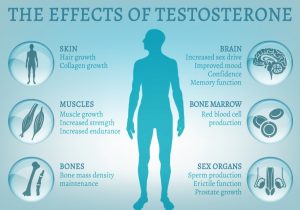What Is Testosterone?
Testosterone is the male sex hormone that is made in the testicles. Testosterone hormone levels are important to normal male sexual development and functions.
Testosterone is the most significant hormone in male sexual development and function.
Testosterone is the hormone most responsible for sex drives and high libidos in men. A decrease in testosterone can mean a decrease in libido.
Ethan Davis
But estrogen needs to stay in balance with testosterone to help control sex drive, the ability to have an erection, and the production of sperm.
One of the biggest worries faced by men with declining testosterone levels is the chance that their sexual desire and performance will be affected.
After age 30, most men begin to experience a gradual decline in testosterone.
A decrease in sex drive sometimes sultantoto the drop in testosterone, leading many men to mistakenly believe that their loss of interest in sex is simply due to getting older.
Treatment of low testosterone in hypogonadism is a fully accepted therapy
Treatment in older men is more controversial
While testosterone therapy can be helpful for those who truly have low testosterone and are bothered by its symptoms, Amory notes that it’s not a wonder treatment that will cure everything that ails men
Discuss your testosterone levels, symptoms, and side effects of treatment with your doctor to establish whether you should receive therapy and what form of therapy.
The major sex hormone in men is testosterone. Some of the functions of testosterone in the male body include:
- Starting and completing the presidenttoto of puberty
- Bone and muscle development
- Growth of body hair, including facial hair
- Change of vocal cords to produce the adult male voice
- Sex drive (libido) and sexual function
- Prostate gland growth and function
- Sperm production
What Is Hormonal Imbalance?
A hormonal imbalance can occur at any point in a man’s life, even in his early 30s. Symptoms can be brought on by stress, an acute injury, illness, poor nutrition, inadequate exercise, and a host of other factors.
Hormones are chemicals that are produced by glands in the endocrine system. Hormones travel through the bloodstream to the tissues and organs, delivering messages that tell the organs what to do and when to do it.
How Does Low Testosterone Differ from a Hormonal Deficiency?
Testosterone—a hormone produced primarily in testicles but also to a lesser extent by the ovaries and adrenal cortex.Is essential for a variety of physical, cognitive, sexual, and metabolic functions in men.
It is important to understand that Testosterone deficiency should only be treated if there are symptoms of Testosterone deficiency and there is a documented low Testosterone on the blood test.
Some men actually have a genetic predisposition for developing high levels of testosterone.
This decline is gradual and of a modest degree, but because many of the changes of aging are similar to those of hypogonadism due to known disease, the decline in testosterone has been postulated to be a cause of these changes of aging.
Studies show that these individuals that fall within this category are at a much higher risk for developing blood clots, heart disease, and a variety of other cardiovascular issues.
What Causes Low Testosterone?
As a man ages, the amount of Capitaltoto in his body gradually drops. This natural decline starts after age 30 and continues (about 1% per year) throughout his life.
Testosterone deficiency may be due to problems within your testicles or with hormone production in the brain.
This can be because of genetic disorders, medical problems, or damage to the testicles. Klinefelter syndrome is a genetic disorder that causes testosterone deficiency.

Signs And Symptoms Of Low Testosterone include:
Erectile Dysfunction
By sending key signals to the brain and penile tissue, testosterone helps with the production of nitric oxide. This kicks off a chemical chain reaction and results in an erection. However, if you have low testosterone levels, those initial signals won’t get through.
Fatigue
Low testosterone can result in a lack of energy. If Muliatoto find that you’re feeling sleepy for much of the day, even after you’ve had a good night of rest, there’s a high chance that a hormonal imbalance is to blame. Many patients find that their energy levels soar after they begin testosterone therapy.
Low energy levels
Many men with low-T report a decrease in energy levels or even severe, chronic fatigue even when they get enough sleep.
Increase in body fat. When your hormone levels become imbalanced, it can affect your metabolism and the way your body burns or stores fat.
Mood swings
A low level of testosterone hormone is also linked with plenty of emotional issues like feeling down and out, stressed, irritable, and anxious.
This is because, in addition to taking care of bodily functions, it also plays a major role in how your brain works.
Physical Features
Probably the largest factor that testosterone affects is your physical features. From a young age, your body’s amount of testosterone dictates things such as voice depth, body hair, and physical composition.
Hair loss
Hair loss, whether on the face or the body, is the clearest outward sign of low T for men and one of the first things a doctor looks for when checking for low testosterone.
The Bottom Line
Though, is that if you have low testosterone symptoms, it’s important to see your doctor.
Then, your doctor can rule out potentially more serious causes of your symptoms, such as high blood pressure or a thyroid problem, and offer treatment that can improve your energy and quality of life.
In the U.S. today, it’s estimated that more than fifteen million adult men have low testosterone, also known as hypogonadism or low libido.
Symptoms of this condition include loss of libido, diminished frequency, and quality of erections, decreased enjoyment of life, decreased ability to concentrate, and decreased sports performance.
Very low testosterone is very unlikely and you probably do not need to worry about it.
But if you have persistent symptoms of falling testosterone levels, talk with your doctor about low T. Diagnosing low T early may help prevent more serious low T symptoms later on.



